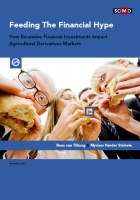Het Voeden van de Financiële Hype
Nieuw rapport van SOMO over negatieve effecten van speculatie met voedsel

Begin december heeft SOMO het rapport Feeding the Financial Hype uitgebracht. Dit rapport belicht het aanzwellende bewijs dat de dramatisch toegenomen investeringen in zogenaamde ‘commodity derivatives’ markten (grondstofderivaten; afgeleide financiële producten van handel in bulk goederen) de afgelopen jaren een sterke stijging van de voedselprijzen hebben veroorzaakt. Dit heeft negatieve gevolgen voor de meest arme mensen, degenen die tot zo’n tachtig procent van hun inkomen aan voedsel besteden. SOMO roept Europese regeringen op om het voorzorgsbeginsel in acht te nemen dat in het Verdrag van Lissabon is opgenomen, en duidelijke maatregelen te nemen om financiële speculatie in grondstofderivaten terug te dringen. Het Europese parlement heeft momenteel die mogelijkheid door strengere regels in te stellen bij de voorgestelde Markets in Financial Instruments Directive and Regulation (MiFID and MiFIR).
Een langere uitleg in het Engels is op de website van SOMO te vinden. (en staat hier ook onder geplakt)
Voor het Report zie hier.
Film {vimeo}32622813{/vimeo}
—————————-
Feeding the Financial Hype
New SOMO report about negative consequences of food speculation
06-12-2011
A new report, Feeding the Financial Hype, is released today by SOMO. The report highlights growing evidence that dramatically increased financial investments in commodity derivatives markets over recent years have caused food prices to soar. This has a negative impact on the poorest people, who spend up to 80 percent of their income on food. SOMO calls on European governments to respect the precautionary principle enshrined in the Lisbon Treaty and to act decisively to bring back financial speculation in commodity derivatives markets. The European Parliament currently has an opportunity to do just this by strengthening the proposed Markets in Financial Instruments Directive and Regulation (MiFID and MiFIR).
Agricultural derivatives markets allow farmers and food manufacturers to reduce their exposure to the risk of price fluctuations (this is called ‘hedging’). This is an important function in agricultural markets, where prices can fluctuate heavily. Food derivatives markets also play an important role in price discovery: futures prices are used in determining the prices in the physical (‘spot’) market and in making investment decisions. For derivatives markets to work well, some financial speculation is often welcome to provide liquidity, making it easier for commercial parties to find a counterpart for their desired trade.
Over the last decade, however, purely financial speculation in commodity derivatives markets – including derivatives of food commodities – has increased dramatically. Total commodity assets, invested mostly through derivatives, have grown within a decade from a negligible amount of less than US$100 billion in 2005 to more than US$400 billion today. As a result, financial speculators have become the dominant party in many agricultural derivatives markets, holding the majority of the contracts, whereas this level was only 10-20 percent before the year 2000.
Financial speculation has been a contributing factor for food prices reaching record levels in 2008 and 2011. People around the world are adversely affected by rising food prices. However, because people in the poorest nations spend up to 80 percent of their income on food (compared to only 10 percent in developed countries), they are affected more adversely than people in richer countries, especially in poor countries that depend on food imports and food aid.
Rising food prices are a direct contributing factor to increases in poverty and malnourishment for millions of people. World food markets have also been affected by other fundamental changes and shocks, such as the increased use of crops for energy production, extreme weather events and a strong rise in demand. However, many studies show that the increased financial investment in commodity derivatives is also contributing to the volatility in futures and spot markets, and hence to the recent price hikes and unpredictable price swings.
Weighing up the evidence, SOMO’s report concludes that increased speculation does more harm than good. The increased financial speculation brings no clear advantages and high food prices have a devastating impact on the most vulnerable people around the world.
SOMO is therefore calling on governments to act decisively and bring back financial speculation in commodity derivatives markets to the level reached before 2000, using the precautionary principle, as enshrined in the Lisbon Treaty of the European Union.
New legislation on derivatives markets is being decided in 2011 and 2012 at the European level. The increasing transparency of physical food markets and food derivatives markets needs to be regulated, as well as increasing the capacity and expertise of supervisors/regulators that process trade information. New rules should impose a strict reduction on the number of financial speculators trading in commodity derivatives, particularly agricultural derivatives. A financial transaction tax would further reduce speculation, as well as reducing changes in agricultural policies.